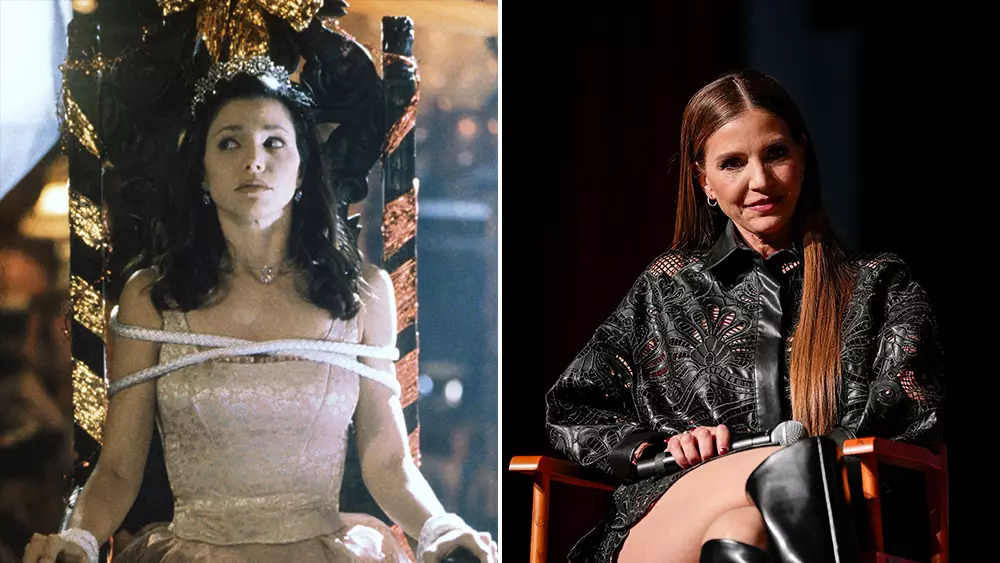The anticipation surrounding a reboot of “Buffy the Vampire Slayer” illustrates how profoundly a cultural phenomenon can embed itself in fans’ hearts and minds. Over the years, viewers have clung to the promise of revisiting Sunnydale’s familiar streets and beloved characters, reflecting a deep emotional connection that goes beyond mere entertainment. Yet, as with many beloved franchises, hope often collides with the harsh realities of logistics, creative directions, and cast availability. The recent clarifications by Charisma Carpenter highlight just how complex and fragile this web of anticipation truly is.
Her denial of involvement in the upcoming project underscores a broader truth about reboot culture: fans often project hopes and desires onto creators and cast members, sometimes without a clear understanding of production realities. Carpenter’s straightforward statement, clarifying she isn’t part of the new series and hasn’t been approached, might be viewed as disappointing but also as a necessary truth that preserves reality from overly optimistic illusions. This kind of transparency, while perhaps frustrating for fans expecting surprises, ultimately helps set genuine expectations and emphasizes the importance of respecting the original creative team’s decisions.
Furthermore, the launch of her Buffy rewatch podcast, “The Bitch Is Back,” reveals an intriguing layer of fandom—how nostalgia is commodified and repurposed to preserve and reinterpret a beloved universe. Carpenter’s insistence that the podcast doesn’t serve as an easter egg or coded message about her participation illustrates a fundamental point: fans often read between the lines, crediting hidden meanings that may not exist. This dynamic underscores a broader phenomenon where fandoms elevate speculation, sometimes to the point of distorting the original intent behind creative projects and personal statements.
Of particular note is Carpenter’s acknowledgment of her hope to reunite with her character, Cordelia Chase, in some capacity. Her previous statements reflect a genuine desire to see a more inclusive, respectful handling of characters who have suffered tragic fates—especially given the flexible canon of Buffyverse resurrections, where death is often a temporary obstacle. Her reflections reveal a yearning for respectful legacy-building, alongside a recognition that the story must evolve and adapt for modern storytelling purposes.
Reboot Realities Versus Fan Fantasies: Navigating the Line
The upcoming series, currently in development with a pilot order at Hulu, seems poised to walk a delicate line between honoring its roots and venturing into new narrative territory. The involvement of talented individuals like Chloé Zhao, with her Oscar pedigree and known fandom for Buffy, hints at a fresh, innovative approach—yet it also raises questions of how much of the original essence will remain. Fans often struggle with this tension: clinging to their cherished memories while also yearning for evolution.
The cast list, featuring a mixture of established stars and promising newcomers, signifies an attempt to bring fresh perspectives into the fold. This mixture acknowledges that to stay relevant in today’s television landscape, the show must strike a careful balance—honoring legacy characters like Gellar’s Buffy while also making room for new heroes and villains. The inclusion of characters like Ryan Kiera Armstrong and the presence of guest stars like Chase Sui Wonders indicate an ambition to craft a narrative that respects the original but isn’t shackled by it.
However, the core question remains: will this reboot genuinely serve the fans or simply capitalize on their nostalgia? Carpenter’s candidness reminds us that creators and actors are unpredictable, and their involvement in franchise reinventions often hinges on complex contractual, creative, and ethical considerations. Fan hope must often contend with the reality that not everyone will return, and some stories are better left untouched than risk tarnishing cherished legacies with half-baked revivals.
A Future Shaped by Respect and Innovation
As the Buffy universe continues to evolve through new series and stories, one thing is certain: the franchise’s cultural impact is undeniable. It has inspired generations, shaped perceptions of femininity and heroism, and set a benchmark for supernatural storytelling. Yet, the danger lies in attempting to recreate that magic without respecting its roots or the desires of those who helped create it.
Perhaps the most critical insight from Carpenter’s statement is that heartfelt fan devotion needs to be matched by equally heartfelt respect from the creators. A reboot should not be a hurried cash grab, nor should it exploit nostalgia without offering genuine innovation. Instead, it should serve as a tribute to the original series—expanding its universe thoughtfully, honoring characters in a way that feels authentic, and embracing both the old and the new with equal reverence. Only then can the “Buffy” franchise sustain its legendary status into a new era, not as a hollow echo of the past, but as a genuine evolution that respects its profound legacy.
